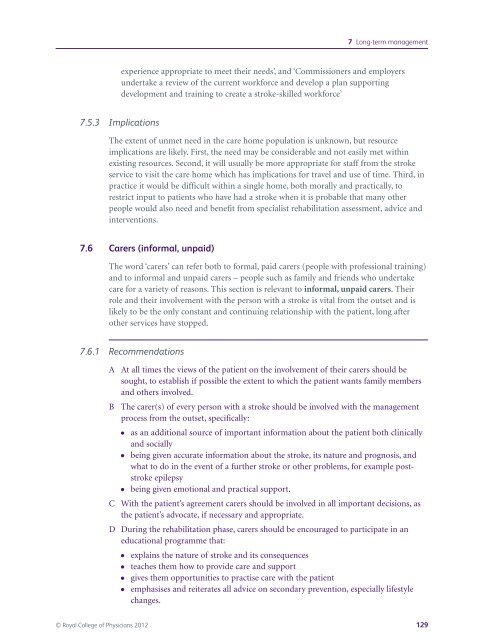national-clinical-guidelines-for-stroke-fourth-edition
national-clinical-guidelines-for-stroke-fourth-edition
national-clinical-guidelines-for-stroke-fourth-edition
Create successful ePaper yourself
Turn your PDF publications into a flip-book with our unique Google optimized e-Paper software.
experience appropriate to meet their needs’, and ‘Commissioners and employers<br />
undertake a review of the current work<strong>for</strong>ce and develop a plan supporting<br />
development and training to create a <strong>stroke</strong>-skilled work<strong>for</strong>ce’<br />
7.5.3 Implications<br />
The extent of unmet need in the care home population is unknown, but resource<br />
implications are likely. First, the need may be considerable and not easily met within<br />
existing resources. Second, it will usually be more appropriate <strong>for</strong> staff from the <strong>stroke</strong><br />
service to visit the care home which has implications <strong>for</strong> travel and use of time. Third, in<br />
practice it would be difficult within a single home, both morally and practically, to<br />
restrict input to patients who have had a <strong>stroke</strong> when it is probable that many other<br />
people would also need and benefit from specialist rehabilitation assessment, advice and<br />
interventions.<br />
7.6 Carers (in<strong>for</strong>mal, unpaid)<br />
The word ‘carers’ can refer both to <strong>for</strong>mal, paid carers (people with professional training)<br />
and to in<strong>for</strong>mal and unpaid carers – people such as family and friends who undertake<br />
care <strong>for</strong> a variety of reasons. This section is relevant to in<strong>for</strong>mal, unpaid carers. Their<br />
role and their involvement with the person with a <strong>stroke</strong> is vital from the outset and is<br />
likely to be the only constant and continuing relationship with the patient, long after<br />
other services have stopped.<br />
7.6.1 Recommendations<br />
A At all times the views of the patient on the involvement of their carers should be<br />
sought, to establish if possible the extent to which the patient wants family members<br />
and others involved.<br />
B The carer(s) of every person with a <strong>stroke</strong> should be involved with the management<br />
process from the outset, specifically:<br />
● as an additional source of important in<strong>for</strong>mation about the patient both <strong>clinical</strong>ly<br />
and socially<br />
● being given accurate in<strong>for</strong>mation about the <strong>stroke</strong>, its nature and prognosis, and<br />
what to do in the event of a further <strong>stroke</strong> or other problems, <strong>for</strong> example post<strong>stroke</strong><br />
epilepsy<br />
● being given emotional and practical support.<br />
C With the patient’s agreement carers should be involved in all important decisions, as<br />
the patient’s advocate, if necessary and appropriate.<br />
D During the rehabilitation phase, carers should be encouraged to participate in an<br />
educational programme that:<br />
● explains the nature of <strong>stroke</strong> and its consequences<br />
● teaches them how to provide care and support<br />
● gives them opportunities to practise care with the patient<br />
● emphasises and reiterates all advice on secondary prevention, especially lifestyle<br />
changes.<br />
7 Long-term management<br />
© Royal College of Physicians 2012 129


